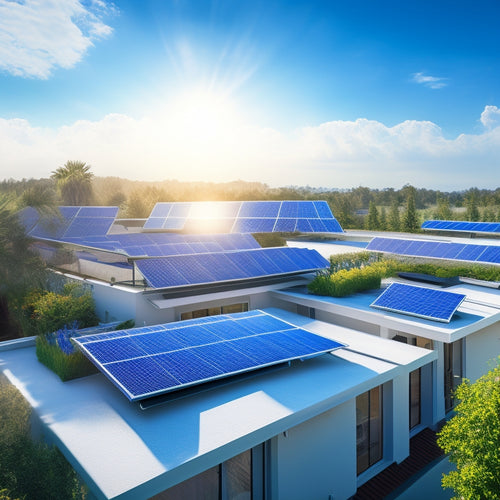
Best Solar Energy Systems for Houses
Share
When it comes to powering your house with solar energy, you've got several outstanding options to evaluate. Industry leaders like SunPower, Panasonic, and Tesla offer high-efficiency panels that can maximize your energy output. Before making a purchase, assess your energy needs, roof condition, and local building codes to determine the best system for you. Additionally, research available incentives, financing options, and costs, which can range from $15,000 to $30,000. As you investigate the benefits of solar energy systems, including reduced energy bills and a lower carbon footprint, you'll want to continue examining the factors that will help you make an informed decision.
Key Takeaways
- Top solar panel brands like SunPower, Panasonic, and Tesla offer high-efficiency panels for maximum energy output.
- Assess energy needs, roof condition, and local regulations before selecting a suitable solar energy system.
- Monocrystalline silicon, polycrystalline silicon, thin-film, and bifacial solar panels cater to different energy requirements and budgets.
- Financing options, tax credits, and rebates make solar energy systems more affordable, with potential annual savings of $400 to $1,000.
- Regular maintenance, including inspections and cleaning, ensures optimal system performance and extends the lifespan of solar panels.
Top Solar Panel Brands
Several top-tier solar panel brands plunge the market, offering high-quality products that cater to diverse residential needs.
You'll find top rated panels from brands like SunPower, Panasonic, and Tesla, which have revolutionized solar technology. These industry leaders have refined their manufacturing processes to produce high-efficiency panels that maximize energy output.
For instance, SunPower's X-Series Residential Solar Panels boast a 22.8% efficiency rate, allowing you to generate more power per hour of sunlight. Similarly, Panasonic's HIT-240 Panel offers a 21.8% efficiency rate, making it an attractive option for homeowners seeking reliable energy solutions.
Tesla's solar panels, integrated with their Powerwall battery, provide a thorough energy system that stores excess energy for later use.
When choosing a solar panel brand, consider factors like warranty, durability, and customer support to guarantee you're investing in a system that meets your long-term energy goals.
Factors to Consider When Buying
When investing in a solar energy system for your house, you're not just buying solar panels - you're committing to a long-term energy solution that requires careful consideration of multiple factors.
You'll need to assess your energy needs, evaluating your current energy consumption and determining how much power you want to generate. This will help you determine the size of the solar energy system you require.
Additionally, consider the condition and orientation of your roof, as well as any local building codes or regulations that may impact your installation.
You should also investigate available solar incentives, such as tax credits or rebates, which can greatly offset the upfront cost of your system.
Financing options are another vital consideration, as they can make your solar energy system more affordable. Look for providers that offer flexible financing plans or partnerships with lenders that specialize in solar installations.
Residential Solar Energy Costs
You're likely wondering how much it'll cost to get started with solar energy for your home.
The upfront cost of system installation is a significant factor, but you'll also want to take into account the potential savings on your energy bills over time.
Additionally, you'll need to factor in ongoing maintenance expenses to guarantee your system runs efficiently.
System Installation Costs
The upfront investment in a solar energy system can be substantial, with the total system installation cost being the most significant expense for homeowners. As you consider investing in solar energy, it's crucial to understand the costs involved.
The average cost of a solar energy system ranges from $15,000 to $30,000 or more, depending on the system size, quality, and installation company.
However, there are ways to make solar energy more affordable. You can take advantage of:
-
System financing options: Many companies offer financing plans with low or no down payments, making it easier to get started.
-
Installation incentives: The federal government and some states offer tax credits and rebates to encourage the adoption of solar energy.
-
Net metering: You can sell excess energy back to the grid and offset your utility bills.
-
Increased property value: Installing a solar energy system can enhance your property's value.
-
Long-term energy savings: Solar energy can provide decades of clean, free energy, reducing your reliance on the grid.
Energy Savings Potential
Every kilowatt-hour (kWh) of electricity generated by your solar energy system translates to energy savings on your utility bill. This means you'll enjoy a direct reduction in your energy consumption costs. The amount of savings depends on your system's size, local electricity rates, and your energy usage patterns.
To get a clear illustration of your energy savings potential, you'll need to conduct a cost analysis. This involves evaluating your current energy consumption and projecting how much you'll save by switching to solar power. You can expect significant energy efficiency gains, especially if you're currently relying on traditional fossil fuels.
On average, homeowners who install solar energy systems can save between $400 and $1,000 per year on their utility bills. However, these figures can vary depending on your location and energy needs.
Maintenance Expenses
How much will maintaining your solar energy system set you back? The good news is that solar panels require minimal upkeep, but it's crucial to factor in some costs to guarantee peak performance.
Here are some maintenance expenses to take into account:
-
Routine inspections: Regular checks to verify your system is running smoothly, typically costing between $100 to $300 per year.
-
Repair costs: Although rare, repairs can range from $100 to $1,000 or more, depending on the issue.
-
Cleaning schedules: Keeping your panels clean can enhance energy output; cleaning services may cost around $200 to $500 per year.
-
Warranty coverage: Check if your system's warranty covers maintenance and repairs; some warranties may have deductibles or exclusions.
-
Performance monitoring: Regular monitoring can help identify issues early on; some providers offer free monitoring, while others charge around $100 to $300 per year.
When choosing a solar energy system, evaluate the maintenance expenses and opt for a provider that offers extensive warranty coverage, routine inspections, and performance monitoring.
Additionally, factor in lifespan considerations, system upgrades, and insurance implications to guarantee you're getting the most out of your investment.
Don't forget to investigate tax incentives that can help offset these costs.
Benefits of Solar Energy Systems
You're likely considering solar energy systems for your house because of their numerous benefits.
By utilizing the sun's energy, you'll have a renewable energy source that reduces your reliance on fossil fuels.
You'll also enjoy zero energy bills and contribute to environmental conservation, making your home more sustainable and eco-friendly.
Renewable Energy Source
One of the most significant advantages of solar energy systems is that they provide a renewable energy source, reducing reliance on finite fossil fuels and mitigating their negative environmental impacts.
By utilizing the power of the sun, you're not only reducing your carbon footprint but also contributing to a cleaner, healthier environment for future generations.
Some of the most persuasive reasons to switch to solar energy innovations include:
- Reducing greenhouse gas emissions and slowing climate change
- Conserving water, a precious resource often used in traditional energy production
- Decreasing air pollution, which can cause respiratory issues and other health problems
- Supporting sustainable energy practices and reducing reliance on non-renewable energy sources
- Enjoying a sense of satisfaction and fulfillment from doing your part for the environment
Zero Energy Bills
By utilizing the power of solar energy, homeowners can greatly reduce their energy expenses, and in some cases, even eliminate them entirely. This is because solar energy systems can generate enough electricity to power your entire home, reducing your reliance on the grid.
As a result, you'll see a significant decrease in your energy bills, and in some cases, you may even be eligible for solar incentives that allow you to sell excess energy back to the grid.
Achieving zero energy bills is a realistic goal for many homeowners, especially those who live in areas with high levels of sunlight. By investing in a high-quality solar energy system, you can enjoy energy independence and break free from the constraints of traditional energy providers.
With the cost of solar panels decreasing over the years, it's now more affordable than ever to make the switch to solar. By doing so, you'll not only reduce your energy expenses but also increase the value of your home and contribute to a more sustainable future.
Environmental Conservation
Solar energy systems offer a cleaner alternative to traditional fossil fuels, considerably reducing your carbon footprint and contributing to environmental conservation.
By utilizing the power of the sun, you're not only saving money on energy bills but also playing a significant role in protecting the planet.
Here are some benefits of solar energy systems that make a substantial impact on the environment:
-
Reduced greenhouse gas emissions: Solar energy systems produce no emissions, minimizing your ecological footprint and helping to combat climate change.
-
Preservation of natural resources: By relying on renewable energy, you're reducing your dependence on finite fossil fuels and conserving natural resources for future generations.
-
Minimized air pollution: Solar energy systems don't produce air pollutants, resulting in cleaner air and a healthier environment.
-
Water conservation: Solar panels require minimal water to operate, unlike traditional power plants that use significant amounts of water to cool their systems.
-
Waste reduction: Solar energy systems generate no hazardous waste, reducing the risk of environmental contamination.
Solar System Installation Process
You're about to take an important step towards utilizing renewable energy: installing a solar system on your house. Before the installation process begins, a thorough assessment of your roof's suitability is essential.
The installation team will examine the condition, size, and orientation of your roof to determine the best solar panel orientation for maximum energy production. They'll check for any obstructions, such as skylights, vents, or chimneys, that might affect the system's performance.
Once the assessment is complete, the installation team will prepare your roof for the solar panels. This involves inspecting and repairing any damaged or rotten areas, ensuring a secure and watertight seal.
Next, they'll install the mounting system, which securely fastens the solar panels to your roof. The solar panels are then connected to an inverter, which converts DC power into AC power for your home.
Types of Solar Energy Systems
Now that your solar system is installed, it's time to contemplate the type of system that will best suit your energy needs.
You've got a range of options to choose from, and each has its unique benefits and drawbacks.
When it comes to solar panel types, you've got:
- Monocrystalline Silicon: High-efficiency panels with a sleek, modern design
- Polycrystalline Silicon: Cost-effective panels with a slightly lower efficiency rate
- Thin-Film Solar Cells: Flexible, lightweight panels perfect for unusual roof shapes
- Bifacial Solar Panels: Panels that capture energy from both sides, increasing overall output
- Perovskite Solar Cells: Experimental panels with potentially game-changing efficiency rates
Solar inverter options are just as vital, as they convert DC power into usable AC energy.
You'll need to decide between string inverters, microinverters, or power optimizers, each with its own strengths and weaknesses.
Best Solar System for Small Houses
Most small houses require a solar system that's both efficient and compact. You need a system that can generate sufficient power without taking up too much space. When it relates to solar system sizing, a smaller house typically requires a system with a lower power output, usually in the range of 2-5 kilowatts.
For compact solar solutions, consider a system with high-efficiency panels that can produce more power per square foot. These panels are designed to maximize energy production in limited spaces. Additionally, look for systems with a sleek and slim design that can be easily installed on your roof without taking up too much space.
Another key consideration is the inverter technology used in the system. A string inverter or microinverter can help optimize energy production and provide more flexibility regarding system design and installation.
Energy Efficiency and Savings
As you invest in a solar energy system for your small house, you're likely wondering how much energy you can save and how efficient the system will be. The good news is that solar energy systems can greatly reduce your energy consumption and lower your utility bills.
With smart technology, you can monitor your energy usage and optimize your energy production to guarantee maximum efficiency.
Here are some benefits you can expect from a solar energy system:
-
Reduced energy bills: By generating your own electricity, you can reduce your reliance on the grid and lower your energy bills.
-
Increased energy independence: With a solar energy system, you're in control of your energy production and consumption.
-
Lower carbon footprint: Solar energy is a clean and renewable source of energy, reducing your impact on the environment.
-
Improved property value: Installing a solar energy system can increase your property value and appeal to potential buyers.
-
Government incentives: You may be eligible for government incentives and tax credits for installing a solar energy system.
Solar System Maintenance Tips
With your solar energy system up and running, it's essential to prioritize regular maintenance to guarantee peak performance and extend its lifespan.
You'll want to perform solar panel cleaning every 6-12 months to remove debris and secure optimal energy absorption.
Inverter maintenance is also important, as it converts DC power to AC; check for faults and replace if necessary.
Battery upkeep is significant for energy storage systems; monitor charge levels, perform regular testing, and replace batteries as needed.
Regular performance monitoring will help you identify any issues before they become major problems.
Be prepared to troubleshoot system errors and make seasonal adjustments to enhance energy production.
Don't forget to check your warranty regularly to confirm you're covered in case of system failures.
Finally, schedule professional inspections annually to catch any potential issues and verify your system operates at its best.
Frequently Asked Questions
Can I Install Solar Panels on a Flat Roof?
You can install solar panels on a flat roof, but you'll need to take into account special flat roof considerations, such as waterproofing and weight distribution, to guarantee a secure installation that still offers benefits like increased energy independence.
Will Solar Panels Increase My Property Value?
Can you put a price on a clear conscience? You'll be thrilled to know that your solar investment benefits extend beyond the environment, as it's likely to enhance your property's appraisal value, making your home more attractive to potential buyers.
Do Solar Panels Work During Power Outages?
During power outages, you won't get electricity from your solar panels unless you have a battery backup system, as standard grid-tied systems shut down for safety; however, your solar panel efficiency remains unaffected, ready to generate power when the grid comes back online.
Can I Install Solar Panels on My Own?
You're biting off more than you can chew if you think DIY installation is a walk in the park. Without proper training, you'll compromise safety considerations, risking electrical shock and fire hazards - it's best to leave it to the pros.
Are Solar Panels Resistant to Hail and Storms?
You're right to wonder if solar panels can withstand harsh weather; high-quality panels are designed to resist hail damage and boast impressive storm durability, ensuring your power supply remains stable even in turbulent conditions.
Related Posts
-

What You Need to Know About Permits and Inspections
You need to navigate the complex landscape of permits and inspections to guarantee your project complies with local z...
-

Why Electric Motorcycles Fail at Long-Distance Touring
You're likely familiar with the excitement of hitting the open road on an electric motorcycle, but you're also smart ...
-

Best Solar Panel Options for Maximum Energy Savings
You can maximize your energy savings with solar panels that boast efficiency ratings above 20%, paired with extensive...


